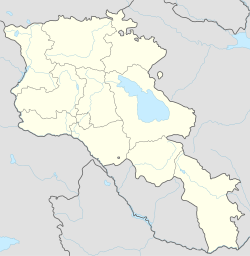Ijevan
| Ijevan Իջևան |
||
|---|---|---|

From top left:
Ijevan skyline • Ijevan central park Ijevan Dendropark • World War II memorial Gugark mountains • Ijevan Wildlife Sanctuary Winter panorama of Ijevan area |
||
|
||
| Coordinates: 40°52′45″N 45°08′50″E / 40.87917°N 45.14722°ECoordinates: 40°52′45″N 45°08′50″E / 40.87917°N 45.14722°E | ||
| Country |
|
|
| Marz | Tavush | |
| Founded | 1780s | |
| City status | 1961 | |
| Area | ||
| • Total | 4.6 km2 (1.8 sq mi) | |
| Elevation | 755 m (2,477 ft) | |
| Population (2011 census) | ||
| • Total | 21,081 | |
| • Density | 4,600/km2 (12,000/sq mi) | |
| Time zone | AMT (UTC+4) | |
| Postal code | 4001, 4002 | |
| Area code(s) | (+375) 263 | |
| Vehicle registration | 57 | |
| Sources: Population | ||
Ijevan (Armenian: Իջևան), is a town in Armenia and the administrative centre of the Tavush Province. It is located in the center of the region, at the foot of Ijevan and Nalteket ridges of Gugark mountains, on the shores of Aghstev River. As of the 2011 census, the population of the town is 21,081, making it the most populated town in the province.
Ijevan is located 137 km northeast of Yerevan. The Yerevan-Tbilisi highway passes through Ijevan.
The town's current name Ijevan, and its former name Karavansara (until 1919), both mean "inn" (caravanserai), in Armenian and Persian, respectively.
The area of modern-day Ijevan used to have many roadside inns known as caravanserais that served travelers between historic Syria and North Caucasus. The settlement became to be known as Istibulagh, literally meaning hot spring in Azeri. On the same site, the small village of Karavansara was founded in the 1780s during the Persian rule. However, during the days of the First Republic of Armenia in 1919, the settlement was renamed Ijevan, meaning inn or caravanserai in the Armenian language.։
It is said by tradition that about 2000 years ago, King Artavasdes I built a city on the place of modern-day Ijevan. He gathered only the beautiful girls and the handsome boys from all over Armenia, so that later they would get married and settle in the newly established town. Thus, the successors of that handsome generation live today in Ijevan.
Being located on a very important trade route between the Levant and Northern Caucasus, the region was home to many rest-houses and caravanserais for the merchants and their caravans. In the 1780s, during the Persian rule, the village of Karavansara was founded. In 1801, the area of Ijevan along with Lori Province and the Georgian territories became part of the Russian Empire. During the rule of Paul I, approximately 6000 Armenian families from Karabakh were allowed to move to the valley of Aghstev river and occupy the region around Karavansara village.
...
Wikipedia


